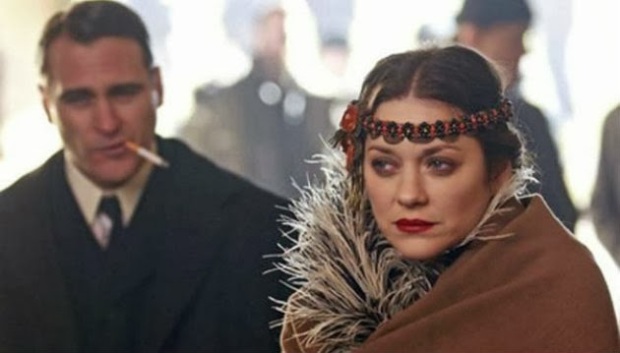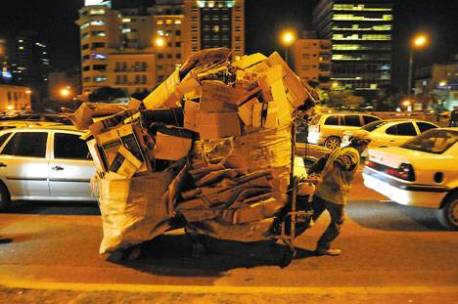Yesterday was one of those blessed days, with a happy confluence of themes that kept echoing and redoubling in every image, video, and show I ran into and through.
I first caught the cloying James Gray film The Immigrant, starring Marion Cotillard as Ewa Cybulskia, a Polish immigrant who tumbles off at Ellis Island in 1921. The gold and bronze baroque set-pieces back a desperate but not uncommon story of that time. Ewa is doomed upon landing, marked as a woman “of low morals” by the island gatekeepers. She is then gently, almost naturally pushed into burlesque dancing, then prostitution, by Joaquin Phoenix, who ham-fistedly builds on his portrait of neurosis in Her.
The film is perfectly shot by Darius Khondji in muted, jeweled, dream-like tones, rich gaslight against the dark hustle and foment of the streets. In one scene, Phoenix and Cotillard are tiny figures in a wooded patch between two Lower East Side blocks, lit by the moon, and you feel a deep longing for an old New York you never had to begin with.
Ewa is frustratingly passive. The men closest to her are obsessed with protecting her perceived innocence, with defining and setting her apart. They perversely elevate her even as they degrade her and drag her through the underworld.
Her own uncle, a respected businessman in Greenpoint, casts her out, unable to deal with the shame of keeping her in. Her aunt touches her hair and says, “The song of the nightingale is sweetest in times of great darkness.”
But Ewa ultimately determines her own value. The first thing she says when she gets off the boat: “I want to work.” Cotillard strives to give Ewa a steely dignity, and dignity is found in work, no matter what kind. She carefully counts each bill, demanding half of each dollar, so she can save her sister stuck in the Ellis Island hospital.
She has wishes of her own – to be happy, to live in California, to feel the sun on her. She will do whatever work it takes. Work is salvation. Work is really the heart of the American Dream. Work helps one keep one’s sanity.
Later in the day, I watched a documentary, Cartoneros, tracing the people of the same name, who sort through the trash of Buenos Aires for paper to be recycled. It was astounding. The cartoneros travel at night on the “Ghost Train” from the shantytowns and slums, sort through the city’s trash, and board before dawn before most people can see them. In the warehouses, workers record the hundreds of pounds of paper and plastic brought in. They wash, grind, compact the paper.
The insights from the workers were extraordinary: “Only with wealth is there waste.” One worker closed a scene with, “People look at it as begging. You aren’t begging. You are asking for work.” Another said this:
“To really know a person, you have to go through his garbage.”
More than anything, the cartoneros wanted respect and dignity. They seemed happy on camera, defiant. For strength and protection, they formed co-operatives, knocking door to door to get the help of citizens.
After the film, I wandered around the area, long winding stretches hedged by monolithic pharmaceutical labs with their clean futuristic lines: Amgen, Pfizer, Biogen Idec, Millenium. Even the smoke piling up from their stacks looks nice and clean. This city is full of all kinds of legitimate, glossy work, easy to write down on paper.
But this city also has, like Buenos Aires and New York, its own hidden work. On Sunday nights you can hear the clink and clatter of people – usually very old, usually Chinese immigrants who speak no English – sorting through trash for bottles, glass and plastic. You see them carrying massive bags to the local Stop & Shop for recycling – the bottles all washed, cleaned and sorted. Last week I was standing, absorbed in my phone, and was jolted out of my reverie by an old man plunging his whole head and torso into a trash bin, then emerging triumphant with a Coke bottle.
I thought on other kinds of hidden work – like knowledge work – after reading Nikil Saval’s recent piece in the Chronicle of Higher Education, on white collar culture and the monolithic bureaucracies that create them. The piece pointed out a dark fact: the work that adjuncts do in institutions of higher learning – the thankless, difficult work of teaching, grading and mentoring students – is now “simply accepted as the new normal.”
I can’t count how many PhDs I know doing extremely very hard, underpaid work, stressed to the point of break. I have countless horror stories from the many researchers, teaching assistants and adjuncts doing what is considered the drudge work that keeps institutions running.
Hidden work, especially knowledge work, surely must have its dignity. But that dignity is more difficult to locate and see in the context of our exposure-based culture, in which the “good neoliberal knowledge worker” is expected to fight for her wage, set her own rate, and tirelessly (without rest, without pause) make and do and create and think until she is her perfect self. This Rhizome piece sums this knowledge worker’s quandary up perfectly:
“In an accelerated economy that runs at digital speed, no corner of existence is outside the realm of private engineering. What kind of governmentality persists when we are impelled into pursuits of productivity and happiness wherein private entities stand to directly profit from our (self-)discipline?
Perhaps in part due to this general collapse of community, institutions, and traditional norms of sociality under networked capitalism, we’re increasingly enjoined into competition, engaging in data entry as a natural correlate of ‘living.’”
In this ethos, we compete as knowledge workers. If we don’t achieve our personal goals, it’s our own darn fault. If we don’t pick ourselves up by our own bootstraps, it’s again, our fault. The other side of this kind of bind – of avoiding stillness, of avoiding inactivity – is that the demands of creativity don’t always involve visible work. (There’s a ton of excellent Bartleby-inspired art that challenges this ethic of constantly working, that stills it, that refuses to work).
Recent controversies over paying creative freelancers and knowledge workers already had me thinking about these questions of worth, value and utility. Seeing the “work” of Ewa and the cartoneros crystallized them.
Who defines your value? A brief scan of inspirational quotes on Pinterest will leave you with the conviction that only we define our own worth. That we have to dismiss external indications of value.
The world will work hard to convince you otherwise, especially as a creative worker. It will hustle to monetize, frame, and tell you what you are worth, to try and convince you to work for free. Swindlin’ is huge in the arts. If you run across a tetchy creative, I’d say, just know it’s probably not about you. They’re likely on the defense from being brain- and energy-drained by editors and others in power who don’t truly value their work but also really, really need it.
Your work is worth it. Your talent is worth it. Never sell yourself short. And make sure to gather your accomplishments relentlessly across all social media platforms, because if you don’t expose your thinking work, how can you capitalize on it?




Leave a comment